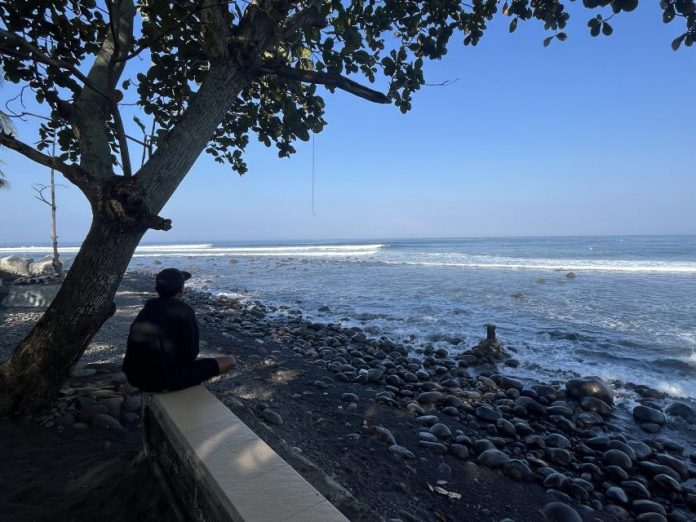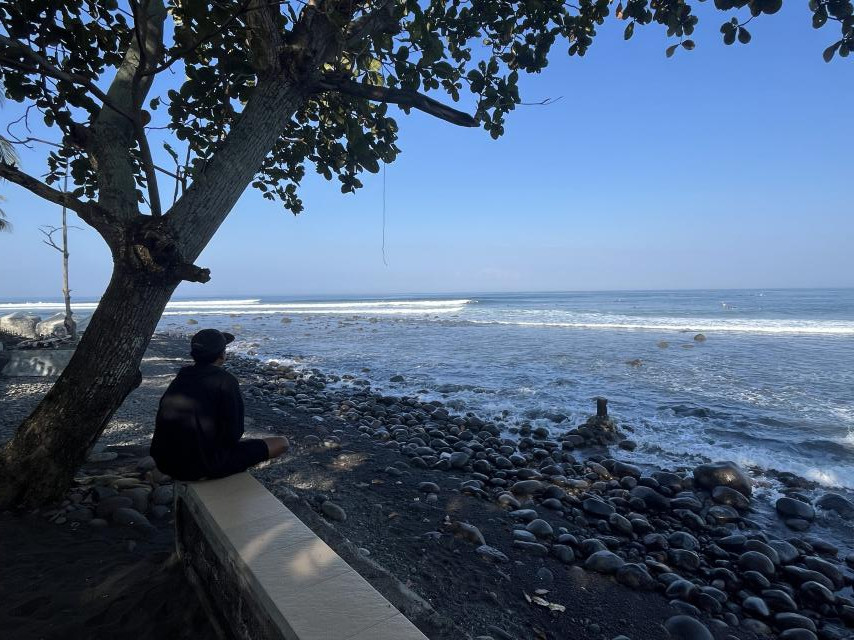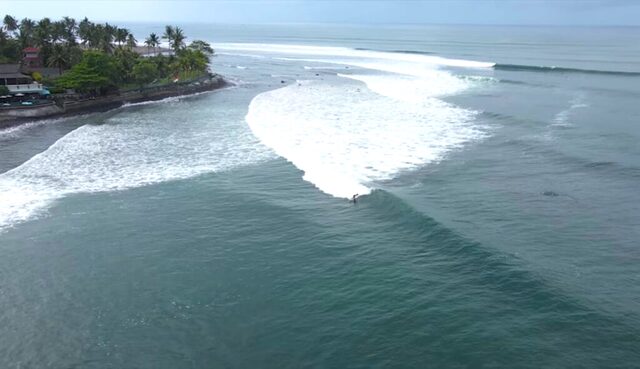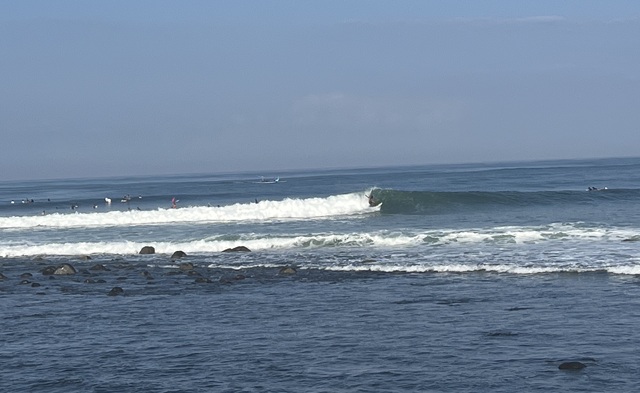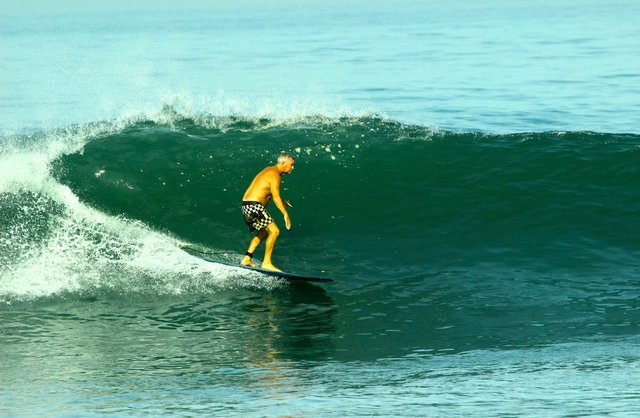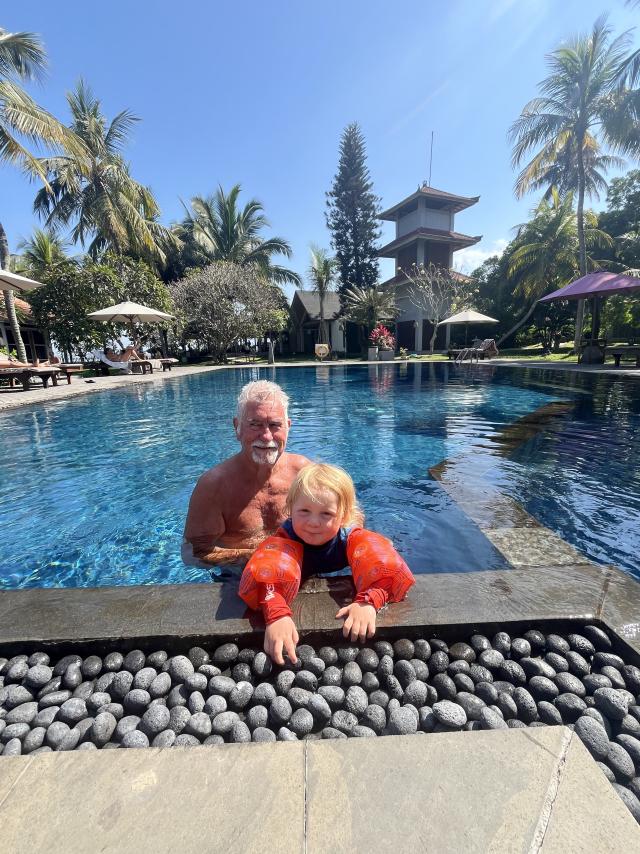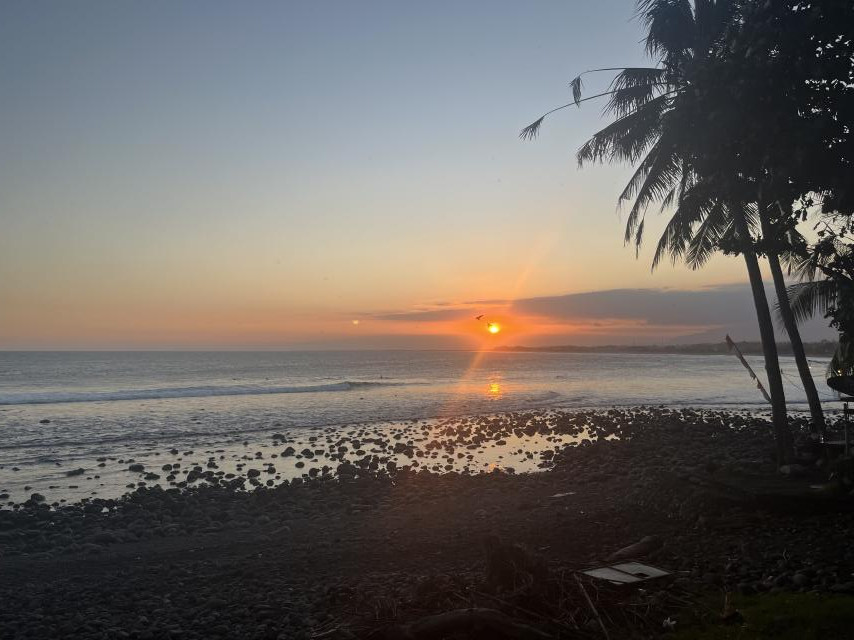We are in Medewi, West Bali, for the waves, which are very good, sizey, clean peaks up on the point which allow you time to get your bearings before the long left hits the middle section and you race your mal down a high line for safety if you’re a senior surfer, or you stall for the barrel if you’re a hot young local.
Although there’s not much to excite along the couple of hundred metres of the Pantai Road that leads to the point and a small but good tourist hotel either side of its end, there is so much more going on in this fascinating village. My old friend, writer and longtime Bali resident Matt George described it best in 2022:
“Far behind you, from the tiled minaret of the unfinished mosque above the narrow highway which is swollen with careening, bleating, overloaded trucks, the Adzan brays over a fuzzy megaphone. The strident five-minute public call to the Islamic faithful that kicks off five times a day at Medewi, the first at 4:15am. That early Medewi hour where only the non-drinking tourist surfers are scraping their boards with wax in anticipation of the first hour of light before the devil wind arrives from the south. The cry of the Adzan describing such a foreign sound in Bali and a reminder that you are at the singular surfing Muslim enclave on this Hindu island.”
On our first morning in Medewi last week I was woken by the Adzan from the now completed mosque and lay in our bed at the Bombora Surf Lodge contemplating the strangeness of that plaintive but melodic wail until the first grey of predawn signaled it was time to wax up and get out there with the son-in-law before the crowd got too intense, gingerly wading off the rocky foreshore to launch into a swell of long interval overhead sets.
I’ve been coming to Medewi to surf this impressive but usually user-friendly left-hand point for many years, but only a decade ago when I was writing a book about Bali did I discover what lay behind its Muslim heritage, for while more than 88 per cent of Indonesia’s population of 273 million are registered as Muslim, Bali remains 90 per cent Hindu, with only a very few communities predominantly Muslim, and none of them blessed with surf like Medewi.
The oldest Muslim community in Bali is found in Gegel, on the outskirts of the town of Klungkung, but deep in the urban space, most of its traditional features have been lost. Medewi is an outlier of the more traditional Buginese Muslim communities. The Bugis, from South Sulawesi, left after the fall of Makassar to the Dutch in the late 17th century and settled in several coastal areas of Bali, one of them being Negara, 25 kilometres up the coast from Medewi.
In 2014 I wrote: “From as early as 700 AD, Hinduism began to spread across Bali, incorporating existing elements of animism and Buddhism until the peculiarly Balinese Hindu Dharma became the predominant culture … By the end of the first millennium, the Indian concept of the God-King was entrenched across Bali. Although the God-Kings of Bali were pretty much left to their own devices for a few centuries, in 1343 the aggressive general of Java’s Hindu Majapahit Empire, Gadjah Mada, imposed his rule over Bali … This rule by divine right was thrown into confusion, however, when in 1515 the Majapahit Empire was overthrown by the Islamic Mataram Empire. The influence of Islam had been growing in Java since the 12th century, they had the numbers and the support of the common people, and the surviving Majapahit leaders, warriors, priests and scholars were forced across the strait into exile in Bali. Although they differ on exactly who did what and when, Bali scholars generally agree that this exile of Majapahit’s “best and brightest” ushered in a “Golden Age”, a period in which Bali was united and its Hindu religion and culture flourished.”
So almost all of Bali got the enlightened Hindus while little Medewi and the rest of what would become Indonesia got the fierce and frightening Muslims. Well, not quite. Despite the bombings of 2002 and 2005, the Hindu majority has maintained cordial relations with the Muslim minority, and anyone who has travelled to remote parts of the archipelago in search of surf from Aceh to Roti knows that Muslim villages can be just as warm and welcoming as Hindu ones, and such is the case in Medewi.
Except, perhaps, for some of the surf instructors, who have developed a clever strategy of pushing their unknowing students like human torpedos into a wedge designed to prevent you from getting a set wave. One will go over the falls while the other might stand up and make it down the face, but you, in the middle will have nowhere to go.
I haven’t surfed Medewi since I was six years younger, so this may have something to do with it, but I know that ever since way back, when my hair went white and the point started to get a bit crowded, the alpha male strategy always worked for me. Wait for him to take the best set wave (as he does every set), paddle straight up to him and say, “I just wanted to tell you that was one of the best waves I’ve ever seen ridden here.” Next set he’s calling you in. Not any more.
But hey, we got enough good ones to make it a memorable visit, the twin hotels of Bombora and Umedewi are closing in on Noosa prices but right where you want to be, the village remains much the same as I’ve ever known it and the surrounding rural scenery, including the exquisite rice terraces that stretch along the coast back to the lush foothills of Batukaru mountain, is stunning.
I’m guessing I’ll be back.

